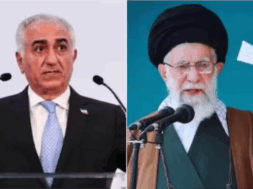
Roving Periscope: Biden’s final push to ‘re-energize’ Quad on Sept 21
Virendra Pandit
New Delhi: To dispel the impression that his four-year presidency weakened the progress of ‘Asian NATO,’ aimed at containing China’s expansionist ambitions, outgoing US President Joe Biden is giving a final push to ‘re-energize’ the four-democracy organization, the Quadrilateral Security Dialogue (Quad), on September 21.
He will host the final Quad Summit of his tenure in his hometown, Wilmington, Delaware, the media reported on Friday.
Initially planned to be held in India, the event was moved to the US to align with the world leaders attending the United Nations General Assembly (UNGA) meetings in New York City later this month.
The September 21 Summit will be attended by the Quad leaders of Australia, India, and Japan, highlighting President Biden’s emphasis on strengthening US alliances in his Indo-Pacific strategy.
It will be President Biden’s fourth in-person gathering with Prime Ministers Anthony Albanese (Australia), Narendra Modi (India), and Fumio Kishida (Japan), reaffirming the importance of the Quad in countering China’s growing influence in the region, the media reported.
His decision to host the event in Wilmington, instead of New York, reflects his approach to diplomacy, signaling a commitment to maintaining and strengthening US alliances, an official said.
The Biden administration emphasized the significance of the Quad since 2021, positioning it as a critical platform for addressing security challenges in the Indo-Pacific region.
The White House views the Quad as a key response to China’s increasing military and economic assertiveness, particularly in the South China Sea. The Summit will focus on strengthening cooperation in health, disaster relief, and maritime security — areas where the Quad has made significant progress.
“The Quad demonstrates that the region values collective action, which has allowed us to promote peace and stability, despite the challenges posed by China,” a senior official said.
While the Quad Summit comes weeks before the November presidential election, Biden and his counterparts aim to secure the alliance’s future beyond their respective terms. The US is preparing to ensure the alliance remains a bipartisan foreign policy priority, including long-term funding from national budgets and securing legislative support for Quad initiatives.
“While the Quad is a cornerstone of President Biden’s Indo-Pacific legacy, it is becoming an institution to shape the region’s geopolitical landscape.”
The September 21 event will also serve as a farewell for Japanese Prime Minister Fumio Kishida, who is stepping down after opting not to seek re-election. Kishida’s successor, however, is expected to maintain Japan’s full commitment to the Quad.
In his last weeks at the White House, President Biden is also planning to travel to the upcoming G-20 Summit in Brazil and the Asia-Pacific Economic Cooperation meeting in Peru in November.
His officials may also organize potential trips to Germany and Africa, besides the ongoing dialogue with Chinese President Xi Jinping. Tensions with China, particularly concerning US alliances in the Indo-Pacific, remain a central issue as Biden looks to cement his legacy in global diplomacy.
His decision to host the Quad Summit in Wilmington also mirrors historical precedents of US presidents hosting foreign leaders in personal settings, such as George W Bush’s talks with Russian President Vladimir Putin at his Texas ranch in 2001, and Barack Obama’s hosting of the NATO summit in his home city of Chicago in 2012.
The ‘Quad’ was formed after the 2004 Indian Ocean tsunami to coordinate disaster relief efforts. The partnership, championed by then-Japanese Prime Minister Shinzo Abe, became dormant for several years because of concerns over China’s reaction. It was revived in 2017 as attitudes towards China’s rising power shifted across the region.
Although China has labeled the Quad as an ‘Asian NATO’, there is no mutual defense agreement in place among the four democracies, which seek to deepen economic, diplomatic, and military cooperation. The group’s shared vision for a “free, open, and inclusive Indo-Pacific” is a direct challenge to China’s regional ambitions.
As the US prepares for a pivotal election in November, world leaders will be watching closely to see whether Biden’s efforts to reinforce alliances in the region will carry over into the next administration, regardless of whether Vice President Kamala Harris or former President Donald Trump takes the helm in 2025.
With Kishida stepping down and Biden potentially in his final weeks as president, this Quad summit could represent a defining moment not only for the Indo-Pacific region but for the global order at large.













